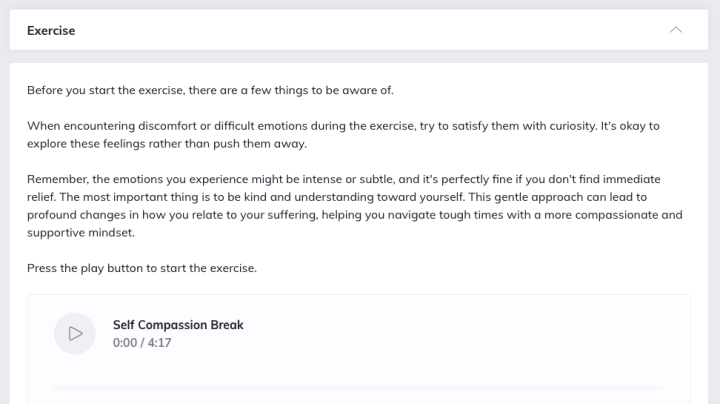We are constantly shaping and adjusting the reality we live in. As coaches, we are also continuously learning and evolving with our clients. This never-ending learning loop benefits both us and our clients but it can be even more beneficial if we know how to leverage different coach styles.
As you probably know, there’s a difference between types and styles of coaching. The former includes, for example, business, lifestyle, motivational, relationship and many more. The latter is about how you coach and what framework or techniques you use.
We’ll go into the details of some of the most common coach styles for you to reflect on whether there are any you would like to further explore. We’ll also show you how Quenza‘s exercises can support each of the coaching styles.
Quenza isn’t just a library with hundreds of exercises. It’s also an HIPAA and GDPR compliant client platform as well as a client management software, including intake forms and scheduling. In short, you’ll have your back office and client journey all on one platform.
Why not see for yourself by signing up for the free, full-access, one-month trial? You’ll be able to create your customized client portals and unique journeys, as of today.
Coach Styles in Context
How do you differentiate yourself in this growing industry? Yes, coaching is in high demand but there are also an increasing number of coaches.
Knowing coach styles and using them as a unique selling point is one way to stand out. Moreover, now that AI coaching is growing, along with various coaching apps, it’s imperative you know how to use the types of coaching styles available.
Gone are the days when coaches could simply rely on the GROW model. Sustained behavioral and emotional change doesn’t just happen on the surface and the GROW model is often quoted as being too linear.
Although, don’t forget that it’s a useful model to share with the leaders you’re coaching. Knowing how to use the GROW coaching model can transform them from a hierarchical or even autocratic style to a more inclusive and motivating leadership one.
Interestingly, when you search coach styles on the web, you’ll come across a mishmash of leadership styles and coach styles. Referring to authoritarian coaching is illogical because, by definition, coaching is person-centered and isn’t about telling people what to do.
Regardless of coach styles, the core approach for the best coaches remains the same. The aim is to guide people with the assumption that clients hold the resources they need to work out their solutions. Again, this is the opposite of sports coaches who leverage their experience to mentor and advise.
So, where does this leave coach styles? Essentially, as most coach training out there explains, coaching leverages evidence-based fields such as psychology, philosophy and even organizational development[1]. As we’ll see below, this transforms into some common coach styles.
Deep Dive into Different Types of Coaching Styles
Where has this sudden growth in the coaching industry come from? Is there really a deep desire for personal change? Perhaps it’s a pursuit for easy answers as suggests Steven Berglas, a psychiatrist-turned-coach[2].
In some ways, perhaps Berglas is right. How many apps out there suggest to people that a few goals and a schedule will make them exercise or stop eating candy? There’s no sustained change without self-reflection and personal insight.
That’s how you as a coach can bring value. Depending on your background, you’ll naturally lean towards one or two but it’s always helpful to have at least a working knowledge of the other coach styles.
Humanist
Based on the work of psychologists such as Carl Rogers, Abraham Maslow, Rollo May, among others, the humanist approach has a major influence on most coaching today. The idea is that we are all innately driven towards autonomy and self-direction, in other words, self-actualization.
Positive Pre-Session Change

The core approach with humanistic coaching is observation and reflective questions, as in this Quenza exercise. You can easily add to the list of questions to encourage your clients to start reflecting even before the first session.
Adult development
Psychologists such as Robert Kegan, Susanne Cook-Greuter, Ken Wilber and others have shown that adult learning evolves in stages of how we view the world and make meaning from it. At each stage, coachees use a different type of language and have unique ways of interacting with the world.
As a coach, you can make sure that their goals and desires match their developmental level. Naturally, it’s also important to know your own developmental level so that you can understand your assumptions of the world.
Various organizations, such as the Institute for Developmental Coaching, can administer and deliver what is now known as the Maturity Assessment Profile (MAP) or Leadership Maturity Framework (LMF). The Innovative Leadership Institute also gives a summary overview of the different adult stages.
Coaching as a developmental coach means shifting from just working on skills and competencies to exploring new ways of observing the complexity of the systems we live in. Such vertical development leads to true transformation.
Self-Compassion Break

Developmental coaching adapts to the client’s sense of the world. Nevertheless, this Quenza exercise in developing self-compassion can be particularly useful when the client is still in the phase of self-criticism.
Cognitive behavioral
This approach was inspired by both behavioral and humanistic styles with the aim to reframe one’s thoughts. As a result, coachees can overcome distorted perceptions and learn to operate more positively with the world.
Many of the CBT exercises can easily be applied to coaching. For example, Putting Thoughts on Trial is a powerful exercise for coachees to see how much their feelings and emotions come from their thoughts. Challenge the thought and different emotions arise.
Unhelpful Thinking Styles- Catastrophizing

You’ll find all the major cognitive distortions presented as exercises in the Quenza library, such as this one. Having these in digital format gives coachees the opportunity to reflect on their own or in situ.
Positive Psychology
While it’s important to not go too far into toxic positivity, using Positive Psychology can balance the mechanistic style that sometimes comes with CBT. CBT exercises and frameworks are invaluable and straightforward for people but sometimes we need to remember the heart[1].
Self-Care Promise

For example, you might work on challenging negative thoughts with a client while also reminding them of self-care with this Quenza exercise. The goal is to marry the cognitive with the emotional for a more holistic experience.
An example of positive psychology in action is strengths-based coaching. Instead of trying to change negative behaviors, the idea is that by cultivating our strengths, we will naturally learn to manage our weaknesses.
Starting a coaching journey with strengths-based coaching can give the client some confidence and the coach some insights but it generally lacks depth. Clients still benefit from developing a holistic awareness of who they are and the fact that every strength can become toxic if taken too far.
Acceptance and Commitment Therapy (ACT)
As a therapy applied to coaching, ACT sits under the umbrella of third generation coaching. Instead of simply focusing on achieving an objective, as in the first generation, or even assuming the client knows their own solutions, as in humanistic and second generation coaching, the third generation goes deeper[3].
Just like with ACT, third generation coaching focuses on values and exploring the self. As such, coaching isn’t just about offering new perspectives. It becomes a dynamic collaboration with shared meaning-making as both coach and coachee explore together what the coachee’s experiences might mean.
Another way to think of it is that ACT offers a blend of mindfulness, acceptance and values work that is both experiential and healing. Of course, it still requires commitment and goals. Alongside that, the focus is on letting go of the struggles of avoidance to gain clarity.
Passengers on the Bus Metaphor

Metaphors are a big part of ACT to help us understand how we are not our thoughts. This reflective exercise is one of the many exercises and meditations inspired by ACT that you’ll find in the Quenza library.
Systemic
None of us operate in isolation. Exploring the factors that influence us with a coach is a powerful way to gain further insights. Factors include culture, family, relationships, work, team, organization and so on. Essentially, the aim is to get curious about the interconnections between all the elements that make up a person’s life. How these impact beliefs and behaviors is then explored.
As a systemic coach, you can truly stand out in the third generation movement by not just following the first-order systems thinking. We all know that there are cause and effect loops around us and in the organizations we live in.
A coach with a more sophisticated understanding of systems and their limitations can more wisely guide their coachees. So, reflection points go beyond gathering data to exploring the power dynamics within a system to how relationships are constantly evolving and changing along with other influences and other systems[4].
Most importantly, systems are still just frameworks and concepts. The top systemic coaches can guide clients to see how they construct the world they operate in and therefore, their thoughts and behaviors.
An example of systems coaching is Integral coaching. This approach is also inspired by adult developmental theory, particularly Ken Wilber’s AQAL model shown below.
By working through the model, coachees can explore subjective, or internal, change. They can further add longer-lasting change by also testing out new behaviors and activities, exploring values and beliefs with others as well as reflecting on the system they operate in.
Ken Wilber’s AQAL Model

The AQAL model, or the “All Quadrants, All Levels” framework, maps the numerous capacities within human experience. Of course, this is also another model and another construct amalgamating a snapshot of viewpoints. Nevertheless, using the model means bringing together different ways of seeing the quadrants. This can, in practice, help clients spot fallacies that block personal change[5].
The list of coach styles could actually go on. So, you could include, for instance, NLP coaching, Gestalt, holistic, motivational interviewing, narrative coaching and existential coaching. In fact, for every type of psychology out there, someone has adapted it for coaching[6].
The question for you is which of these coach styles techniques jump out at you. Which one would you feel more comfortable with and could you include it as a specialty on your coaching bio?
Which Coaching Style is Most Effective?
The question isn’t so much “which coaching styles are most effective”. Instead, consider “how can you apply coach styles to be the most effective”. Regardless of where you are on your developmental journey, you will naturally suit certain coach styles as well as certain coaching clients.
For example, if we look at adult developmental styles again. A post-conventional coach who sees the dynamic interactions of all our concepts and constructs and who can blend chaos with order while using polarities to open up perceptions will not necessarily match well with expert thinkers.
Expert thinkers, who are at least a third of the population, operate through logic and rules. They see feedback as personal criticism and are focused on improving their techniques and efficiencies. For them, an achiever style coach at the next stage above them could be a good match because they are still close to them in how they think. Such a coach knows how to speak their language to show them the value of working through other people rather than just relying on one’s own craft and set of beliefs.
Overall, effectiveness depends on many factors including you, your client, the environment and context, the culture and so on. So, make sure you know yourself and what you offer so you can pitch to the right clients.
DuPont Bradley Curve
Context is also another important consideration. When working with businesses, the maturity level of the organization also has a major influence. You then fit your coach styles accordingly. So, cognitive behavioral coaching works well in dependent and independent organizations. Interdependent cultures are more mature and might respond better to integral or systemic coaching as well as developmental coaching.
The DuPont Bradley curve, pictured below, is a useful diagram to help coaches and coachees gauge where their organizations sit. This curve was originally detailed by a Dupont employee, Berlin Bradley, in 1995 when he investigated how organizational culture and performance impacted the level of safety measures undertaken. It has since expanded to be applicable to organizations in general and can be a useful guide for culture change[7].

In summary, all coach styles have a time and place. The real distinction for maximum impact is to know how to adapt and leverage the various styles to the coachee, context and systemic challenges.
Generalist or Niche Specialization?
Within context and environment, we also have various coaching niches currently out there. With almost a specialization for every potential human problem, the choice is vast.
Some coaches start more generalist and as they develop into the profession, they align with one or more coach style techniques. Others again are driven by a specific problem they might have resolved. They then wish to serve others who are facing the same one such as relationships, mindset or others.
To give you some examples, a transformational coach might leverage an adult developmental approach. In contrast, a mindfulness coach might tend towards ACT and Gestalt coaching.
If you look at life coaching versus business or executive coaching, you might find coaches using holistic, positive psychology and cognitive behavioral coaching in the former. With their business coachees, they might use systemic coaching and developmental coaching.
There is no fixed rule and any of the coach styles can be adapted to any situation. It’s up to you, the coach, to create that amalgamation of the perfect ingredients that deliver the right experience for your clients. That’s when the benefits of coaching styles can shine through.
Coach Vs. Therapist: The Difference in Styles
As you can probably tell, all these types of coaching styles heavily borrow from psychology and therapy. The main difference is that therapists tend to work with the past. Coaching, on the other hand, focuses on the present in order to create a new future. Moreover, coaches don’t assume anything needs to be fixed as opposed to traditional therapy. Although, that is changing in today’s therapy approach.
The coach vs therapist distinction also relates to the type of training they have. A therapist will go into the details of psychology and mental issues while coach training tends to focus on areas like performance, mindset and goals .
Moreover, depending on the coaching organization you belong to, you’ll have perhaps 10 or so hours to complete with a mentor after certifying. On the flip side, therapists and counselors tend to complete at least 200, 400 or more hours with a supervisor after they complete their certification. This is because of the severity and type of problems that therapists tend to deal with.
In short, coaches guide functioning adults to wiser life decisions but therapists can find themselves dealing with clinical issues to enable adults to function better in the present.
Your Ongoing Development
There are many coach style resources out there, including some of the links and books referenced in this article. It all starts by first understanding coaching niches and your style and preferred approach.
Everyone has to find their own path and you might even want to work with a coach if you’re stuck. Either way, get to know yourself so that you can define your purpose. From there, it will be much easier to find the right coach style resources for you and then, the right clients.
Once you have your clients, learning never stops and neither does your range of services. You need to stay on top of digital tools to make sure you stay fresh and modern. Quenza is one such platform where you can create unique client journeys.
With Quenza’s pathways, you can put together a blend of exercises that borrow from the different coach styles. Everything is customizable and very straightforward to put together. So, you can easily adapt to each of your clients and their context.
As a result, your clients will feel valued and continuously supported with their very own Quenza client portal. You’ll no longer be wondering “which coaching styles are most effective”. You’ll be focused on maximizing each individual’s experience and potential for greatness.
Which Of the Coach Styles Will You Adopt?
Coaching is just as much about ourselves as it is about our clients. Knowing the different coach styles allows you to better understand your approach. You can then keep evolving yourself as you adopt new coach styles.
Whether you choose to specialize or to simply flex the coach styles as required, is up to you and your unique value proposition. Either way, make sure you keep flowing with your ever-changing reality. Try things out, talk to others, get feedback and generally keep challenging your tools and coach styles.
Why not start by signing up for the free, full-access, one-month trial with Quenza? Explore the interface and play around with the exercises, visualizations, metaphors and more.
Which of the coach styles do you recognize in Quenza’s library? Which ones can you start using more of, as of today? Both you and your clients will benefit from this burst of freshness and energy as you both keep striving for transformation.
References
- ^ Williams, P., & Menendez, D. S. (2015). Becoming a Professional Life Coach: The Art and Science of a Whole-Person Approach (2nd). WW Norton & Company.
- ^ Berglas, S. (2002). The very real dangers of executive coaching. PubMed, 80(6), 86–92, 153. https://pubmed.ncbi.nlm.nih.gov/12048997.
- ^ Stelter, R. (2014). Third generation coaching: Reconstructing dialogues through collaborative practice and a focus on values. International Coaching Psychology Review, 9(1), 51-66. https://doi.org/10.53841/bpsicpr.2014.9.1.51.
- ^ Lawrence, P. R. (2019). What is Systemic Coaching? Philosophy of Coaching, 4(2), 35–52. https://doi.org/10.22316/poc/04.2.03.
- ^ Wilber, K., Patten, T., Leonard, A., & Morelli, M. J. (2008). Integral Life Practice: a 21st-Century blueprint for physical health, emotional balance, mental clarity, and spiritual awakening. Shambhala Productions.
- ^ Palmer, S. & Whybrow, A. (2007). Handbook of Coaching Psychology: A Guide for Practitioners. Routledge.
- ^ Jasiulewicz-Kaczmarek, M., Szwedzka, K., & Szczuka, M. (2015). Behaviour based Intervention for occupational Safety – case study. Procedia Manufacturing, 3, 4876–4883. https://doi.org/10.1016/j.promfg.2015.07.615.

